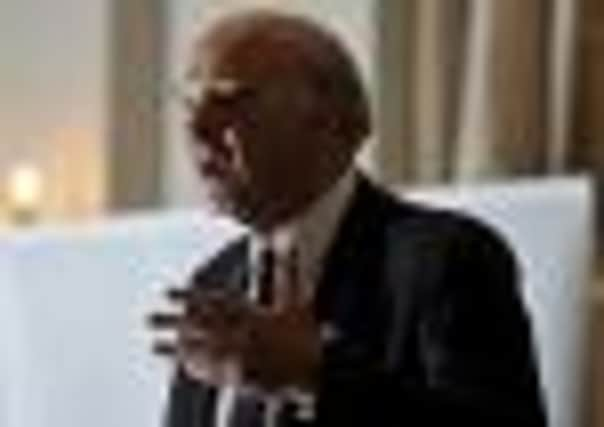Leaders: Downgrade a critical verdict on coalition


To that extent the assessment of the business secretary Vince Cable that the loss of this top-notch rating is “largely symbolic” and limited in its impact might be defended.
However, it is the critical verdict on the coalition’s progress in staunching the growth in debt and its failure to lift the economy out of stagnation that should surely command government attention. These were the principal reasons for Moody’s to act as it did. The timing of its move, coming in the midst of a bitter by-election battle and ahead of a budget where the Chancellor is set to fall short of his deficit reduction targets, has given its verdict an additional electric charge.
Advertisement
Hide AdAdvertisement
Hide AdThis could surely not have been lost on Mr Cable. The verdict has also exposed the pound to another bout of weakness, having already fallen 7 per cent in recent weeks.
It is here that Mr Cable’s reaction hovers between complacency and wilful blindness. Businesses will now be concerned that interest rates may be forced up to prevent further sterling weakness getting out of hand. And the logic of the rating agency’s position would suggest that the Chancellor redouble his efforts to curb the budget deficit, either by tax increases or by further spending cuts. It is towards the latter course the Chancellor is set to lean.
Whatever economic strategy was chosen, the UK’s haul back to economic health was always going to be slow and painful. Our debt mountain, rising relentlessly towards £1.3 trillion, leaves an annual debt interest charge, already at £40 billion and set to hit £60 billion, imposing a colossal drain on this country’s resources. Other countries are faring little better. Germany has suffered a growth setback, France is begging for more time to meet the European Commission’s deficit reduction targets. And the pace of America’s recovery is problematic.
Little wonder some searching questions are being asked across the G20 of the pursuit of economic growth through even tougher cuts in government spending than have already been imposed.And here in the UK the problem is compounded by massive debt overhangs on bank balance sheets and sluggishness in tackling bank reform. Indeed, it is becoming increasingly clear that the coalition has sought to put easy monetary policy – quantitative easing – above more difficult but compellingly necessary re-structuring and reform. Measures are needed to help banks step up lending by write-downs of existing bad loans and measures to encourage business start-up and investment.
This the home turf of Mr Cable, and where he now needs to concentrate his efforts with a Budget just weeks away. A “same again” performance on 20 March would leave the country – and the government – even more exposed than we and they already are.
Chewing over a valiant victory
Were any of the 67,000 crowd at Murrayfield yesterday left with fingernails? Seldom did a Scottish rugby XV looked more outplayed in the first 40 minutes of a game than it did against Ireland in the RBS Six Nations tournament. And early in the second half a try by Ireland seemed to hammer a nail into the coffin of Scottish hopes.
So how on earth did Scotland go on to win? Ireland dominated for most of the game, enjoying an astonishing 78 per cent of territory and 80 per cent of possession before the break. Yet despite this dominance it had secured only three points. But seldom has a Scottish side showed more gutsy determination than in the second 40 minutes of this encounter.
They held back the Irish assault with heart-stopping tackles and trenchant work by the forwards in scrum and ruck. Where Ireland seemed to lose composure and concede penalties in critical defensive positions, the boot of Greig Laidlaw never failed, kicking Scotland to 12 points against Ireland’s tally of eight.
Advertisement
Hide AdAdvertisement
Hide AdThis was not spectator rugby by any means. Indeed, Ireland seemed to suffer from the same palsy that plagued Scotland for many seasons – plenty of possession but lack of follow-through to put points on the board.
It was a game marked by blow-ups and penalty infringements and the game swung on Scotland’s ability to master adversity and avoid these while Ireland conceded faults. However, inspiring defence gave Scotland its first back-to-back victory in the Six Nations since 2001 and keeps their championship hopes alive.
What a startling change from the mood just three months ago. There may have been no fingernails left at Murrayfield, but little wonder the crowd was jubilant.